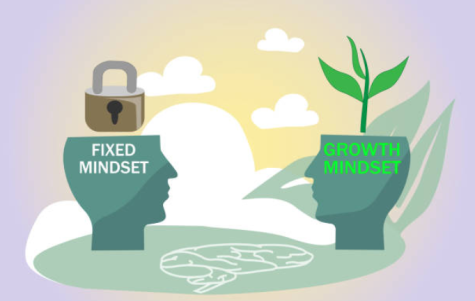What is the impact of one’s mindset on success?

https://openclipart.org/detail/299885/sketched-man-brain-silhouette-prismatic
One. Two. Three. Success isn’t gained within a couple of seconds. Instead, the human mind plays a role in designing the best suitable environment for achievements. Imagine working in a dark cold room, while you’re expected to finish writing a research paper in a couple of hours. How can our mindset trick the challenges in the real world to complete a task? You can use your mindset as a climbing ladder to your desired successful paper.
Having a mindset that is aimed toward success is similar to having a purpose and a driven passion in life. This mindset is the belief that achieving better outcomes can be determined by the state of one’s mind.
While there are many different types of mindsets, such as growth mindset and fixed mindset, each performs different solutions and expectations. These mindsets can be useful in people’s daily routines, either during school or at work.
A Stanford Report shows how mindsets play a significant role in determining life outcomes. By understanding, adapting, and shifting one’s mindset, overall health can improve causing decreased stress while having resilience to life challenges.
The human mind is like a game of chess, anticipating the outcome isn’t easily achievable. Most importantly, some surroundings influence personal ability and may distract the goal. All of this is needed for evaluation, but a mindset can be a main factor in influencing someone’s success, whether personal or professional. You can think of it like a recipe, the first significant ingredient is behavior. If a person just met you, their only judgment will lie on outer behavior.
The outcomes we produce are primary distinctions to how our mental health is changing, it will ultimately depend on the path chosen. Many people mix up success with the goal thinking they are meant to be the same. However, setting a goal means a challenge is happening and is in progress. Success is more about the purpose and the guidelines of the race, for many people, success is their way of balancing their rational and irrational minds.
What about mindsets and self-care? An article by Harvard Business Review states that it’s critical to reward not just effort but learning and progress, and to emphasize the processes that yield these things, such as seeking help from others, trying new strategies, and capitalizing on setbacks to move forward effectively. In all our research, the outcome — the bottom line — follows from deeply engaging in these processes.
Being successful means that the barrier of feeling stressed is broken due to a new chapter of experiences. While these ingredients of the recipe are important, they can never replace the value or urgency of setting a mindset. Which type though?

The difference between Fixed and Growth Mindset
Type 1 – Growth Mindset:
It’s agreed that a good mindset is a way to help shape and make sense of the world and its surroundings. However, people should think about the long-term impact of setting a mindset. One such mindset is a growth mindset. A growth mindset is when you tell yourself that your skills and development will improve over time with work.
Essentially, it is the feeling that “I can learn to do so much more.” With this mindset, there is no such thing as being “perfect” because a growth mindset describes growth and development, it’s even in the name!
This specific type of mindset loves challenges, as it believes that those challenges are the key to success and talent. It asks people how they expect themselves to be better at something if they never try it. The writer Kendra Cherry recently stated the following, “people with this mindset don’t necessarily believe that everyone can become Einstein or Mozart just because they try. They do, however, believe that everyone can get smarter or more talented if they work at it.”
This mindset is arguably the most effective kind. A person who is always trying to become better achieves success quicker and in effective ways, as they believe that failing only comes when a person stops trying.
Effort and persistence have a strong correlation with positive growth, people have found that nothing can seem hard or impossible once work has been dedicated towards it. Overall, a growth mindset means that you thrive on challenges, and don’t see setbacks as a personal failure.
What happens once you’ve established this mindset? Skills for work, school, and daily life improve. People who have a growth mindset are gaining strength through their weaknesses, and nothing can shift their motivation. It’s like growing a plant: the more you give it water, the stronger and healthier it gets. However, there is always another side to this mindset spectrum.
Type 2 – Fixed Mindset:
A fixed mindset has proven to result in limited and restricted success. The main myth associated with a fixed mindset is that it mainly exists in children, truth be told, anyone can set a fixed mindset goal for themselves regardless of their age.
In a fixed mindset, intelligence and abilities are viewed as finite and something less able to change or evolve. To think fixedly eliminates the reasoning of how mindset is largely based on the stability of abundance and scarcity thinking. One example of having a fixed mindset is when you say, “that’s just who I am. I can’t change it.”
The flaws of this mindset are mainly related to the lack of growth and change. People with a fixed mindset believe they need to be good at something immediately or they just weren’t born good at it.
A fixed-minded person aims to avoid challenges in life. These people give up easily and can become alarmed by the success of others. This is due to seeing their intelligence as something that can’t be further improved. Without properly learning and acknowledging weaknesses and strengths, no progress can be made. This isn’t to say that people need to be ideal and perfect, they just need to try and grow.
Those with a fixed mindset are less likely to see opportunities for self-improvement. That’s why adults and children learn new information and skills better when they adopt a growth mindset. Any task or goal will have obstacles to overcome and sometimes even setbacks. By approaching these tasks with a growth mindset, we are better able to persevere in the face of failure.

Positive thinking is through gaining a beneficial mindset
Overall, success is personal to everyone and will not look the same for two people regardless of how similar they are. Mindsets are the same thing, they can drastically help build achievements. Even if it isn’t something physical, it holds a strong meaning and value to it.
The growth mindset stimulates one’s willingness and overall foundation of belief to achieve bigger and better outcomes. The fixed mindset describes a false reality that life is too hard to change and make better, therefore, people struggle in achieving ultimate success.
The most important piece of advice that should be taken into consideration about mindsets is to encourage a growth mindset rather than a fixed mindset. You are more likely to succeed when you work hard and believe in yourself.






